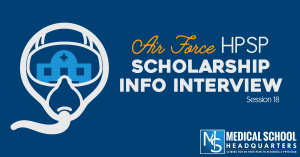
In today’s episode, Ryan talks with TSgt Stephanie Satinsky to discuss the Health Professions Scholarship Program (HPSP). Stephanie is the Air Force HPSP recruiter for the New England area. Ryan could have gone through this topic by himself, but he wanted to bring in someone who can discuss the program as it is at the present moment.
Today, Stephanie talks about what the HPSP is all about, what the Air Force is looking for during the application process, the minimum scores involved, the maximum age, the money involved, and everything in between.
And by the way, know that the Air Force, Army, and Navy all offer scholarships under the same Department of Defense (DOD) guidance with some variations on what each service offers. If you are interested in the scholarship, or even just starting to gather some information, please take a listen above!
[Related episode: National Health Service Corps Scholarship Info]
Students receive a signing bonus ($20,000) for a 4-year scholarship.
[Related episode: Shadowing a Military Physician, HPSP, and More]
Google 48-123. Go to chapter 5 and see all the restrictions.
[Related episode: Will the HPSP Scholarship Be Too Hard with a Family?]
[Related episode: Medical School Scholarships: Get Paid to Study]
It might not be for everyone, but you won’t know until you start looking into it and ask questions. This could open up a whole different career for you, as you’ll be touching lives not only in the US but around the world.

Lorem ipsum dolor sit amet, consectetur adipiscing elit
I just received my admission to XXXXX! This is unreal and almost feels like I am dreaming. I want to thank you for all of your help with my application. I cannot overstate how influential your guidance and insight have been with this result and I am eternally grateful for your support!
IM SO HAPPY!!!! THANK YOU SO MUCH FOR ALL YOUR HELP, IM INDEBTED TO YOU! Truly, thank you so much for all your help. Thank you doesnt do enough.
I want to take a few moments and thank you for all of your very instructive, kind and consistent feedback and support through my applications and it is your wishes, feedback, and most importantly your blessings that have landed me the acceptance!
I got into XXXXX this morning!!!! It still has not hit me that I will be a doctor now!! Thank you for all your help, your words and motivation have brought me to this point.
I wanted to once again express my heartfelt gratitude for your help in providing feedback during my secondary applications. Your guidance has been instrumental in my journey.
Just wanted to share my wonderful news! I received my first medical school acceptance! Thank you for all that you do for us Application Academy!!!
I am excited to tell you that I just got my third interview invite from XXXXX today! I can’t believe it. I didn’t even know if I was good enough to get one, let alone three – by mid-September. Thank you so much for all of your help and support up to this point; I would not be in this position without it!!
I wanted to thank you for helping me prepare for my XXXXX interview. Even in a 30-minute advising session, I learned so much from you. Thank you for believing in me, and here’s to another potential success story from one of your advisees!
I just received an acceptance with XXXXX! This is so exciting and such a huge relief and so nice to have one of our top choice schools! I also received an interview with XXXXX which brings the total up to 20 interviews! Thank so much, none of this would have been possible without you!